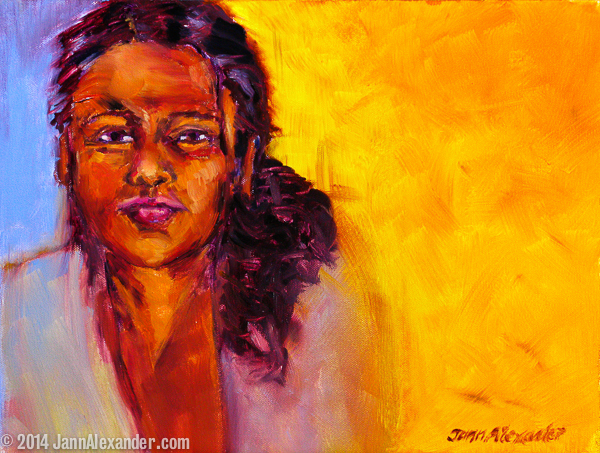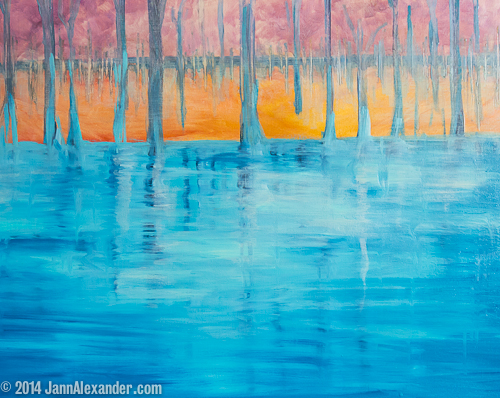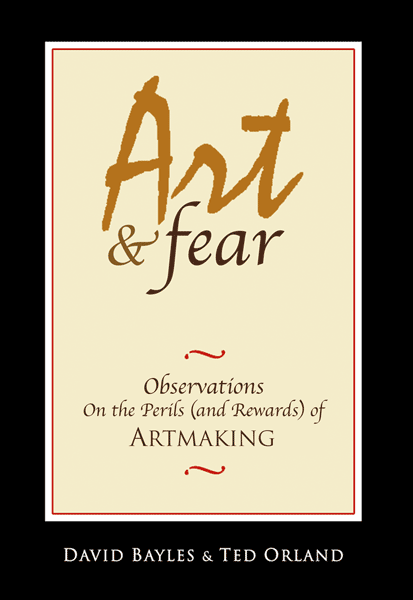Why The Fear of Ruining Your Art Will Ruin Your Art

Have you ever felt the fear you’ll ruin your painting?
It sneaks upon you insidiously, when you’ve been painting in flow for days, and you’re least expecting art fear to overtake you. But suddenly there you are, one morning, studying your painting-in-progress, coffee cup in hand, and it happens: you know your painting needs something. Just one or two little tweaks, a more dramatic brushstroke across the sky, highlights to perk up the water . . . and then it will be complete, a masterpiece, perhaps your best painting ever.
Except. You fear you’ll ruin it.
Your arm is frozen, you cannot squeeze pigment from a tube of paint, you hesitate to pick up your favorite sable brush. You really, really don’t want to ruin your painting.
Your need for perfection will ruin your painting every time.
That desire to make it perfect, that fear of ruining it, will always lead to painting doom. That need to control—in a medium where total control is actually undesirable—will yield a forced, out-of-control painting, no longer reflecting your style and your soul. So don’t go there. Take a step back, put down your coffee cup, and have a heart-to-heart talk with yourself. Ask yourself some questions, like
- How exactly might I ruin this painting?
- What’s the absolute worst that can happen?
- Why am I so afraid I’ll ruin it?
- Will this (irrational) fear subside if I do something else for a while?
- Is there someone I trust to share my painting (and my fear) with?
- Why does it matter if I don’t think it’s perfect?
- Will anyone else really care if my painting isn’t perfect?
- Or is my voice the only demanding, hyper-critical one I hear?
Listen to your answers. Discover why you’re afraid of what you enjoy about painting. Accept the joy in just making art.

Don’t let fear become the biggest influence in your creative life.
Think about what’s influencing you: Fear. Fear of ruining it. Fear of finishing it, and it not being good enough. Fear you won’t like what you’ve painted. Fear of [insert your fear here] ________.
If a painting were meant to be perfect, crisp and thorough in every detail, it would be a photograph. And if that’s what you demand from your art, you might be happier making photographs instead of paintings.
But if you’re a painter, and it’s part of your soul and the way you breathe, you know it, and you have a special gift. The price you pay for that gift is that you’ll have to let go of your perfectionism. A painting can never be perfect. It can be pleasing, it can thrill its viewers, it can be admired for its technical prowess, it can be calming or bold, provocative or evocative, but perfection isn’t what painting is about.
“Art is more real than you realize. There is truth in what you paint.”
Painting is about the process. And the process is messy. It’s an unknown journey, in a way—not unlike traveling and child-rearing and life itself. It’s about getting there, learning, experiencing and all of the wonderful tactile pleasures of making something with your hands. It’s about your memories, your fantasies, your moods. It’s more real than you may realize. There is truth in what you paint.
Fear is not part of the process. It cannot be. Because we can never be fully engaged in what we fear.
Stay committed to your love of painting.
If fear becomes your overriding influence, you’ll need to re-engage your desire to remain committed.
How do you stay committed? You keep on going. You keep doing it. You adopt the What the Hell attitude.
Artist and author Jo Ann Brown-Scott trumped her fear of ruining a beloved painting-in-progress (explained at her blog, The Creative Epiphany) with her What the Hell approach:
“What the hell, I can always paint another one.”
—Jo Ann Brown-Scott
Brown-Scott seldom starts a painting “with the goal of perfection—because I just don’t believe it is a noble pursuit. Sometimes I have a composition in mind and sometimes I just want to be following the paint . . . because I am convinced that the paint speaks to me.” Have you ever thought about just “following the paint”?

Read
Find your commitment to painting again by delving into your fears. Be fearless. If you’re not feeling fearless, Act As If (to borrow a well-known self-help group’s phrase). And bolster your commitment with these resources:
- 5 Fears that can Destroy an Artist at the SkinnyArtist.com: You’re not the only one.
- 5 Timeless Books of Insight on Fear and the Creative Process at Brainpickings.org: From Claude Monet to Orson Welles to Twyla Tharp, the great artists we admire have dealt with staying committed.
Finally, take comfort in da Vinci’s (yes, that da Vinci) approach to commitment:
“Art is never finished, only abandoned.”
~Leonardo da Vinci
Fearful or not, I publish my paintings HERE. I’d love to hear what you think.
How do you keep your fear of ruining your art at bay?
Click Here to get your free monthly digest of Popular Pairings.





Absolutely excellent post, Jann. And you’re right, when I look at your paintings, and those of Jo Ann and all painter artists, I only see incredible artistry, talent, and beauty…I don’t see that you may have had fear, or that it’s not perfect (they all look perfect to me; I know beauty when I see it). I love the portrait of the woman at the top of your post today, she’s beautiful, and the colors you’ve chosen are captivating.
Appreciate hearing that the imperfections aren’t obvious to anyone but the painter; thanks, Angeline, for confirming that opinion, and for your kind words of encouragement. I’ll bet you’ve never been struck by the fear of ruining your art, have you?
Oh, when I start fooling around with settings on my camera and I may not have another opportunity at the shot I am fearful, or when I start fooling around with edits.
Luckily, when we work with our photos, we have the magic Command-Z at our fingertips (usually). If we had that same option when painting, we could eliminate a lot of art fear! Thanks for the feedback, Angeline.
You might appreciate this post, similar topic, another take on it:
http://austindetails.me/2013/10/25/expressing-yourself-is-always-a-work-in-progress/
Happy Creating!
Thanks, Jann. Last bullet point says it all.
Thanks for taking a look. Yep, it’s always about the process!
Thanks for the inclusion Jann! and I love your painting!
I have re-blogged this post of yours and hope that I did it correctly – the article is so important and meaty and I wanted more people to see it.
The inspiration for this post was triggered by yours, Jo Ann, and it’s wonderful of you to share this. It’s an ongoing struggle that artists face, and hopefully, are able to surmount with occasional reminders that it’s natural and that they’re not alone. Thank you for your compliments about my painting.
Thanks for the reblog, not sure it worked? Haven’t seen it. And on a similar note . . . Another post on art and fear:
http://austindetails.me/2013/10/25/expressing-yourself-is-always-a-work-in-progress/
Once again I have re-blogged this post – if it does not work then I have a bone to pick with WordPress and it would not be the first time!!
Thank you again, Jo, wonderful to talk with you and find someone else born at Good Sam. Let me know if the reblog worked! Never had much luck with that myself.
i paint but well, i paint cars and restore hot rods etc etc, different kinnsa trials, but a lot of what u say is relative to what i do an how i do it also to come up with what we might call a finished product take it er eave it sumtimes huh 🙂 as long as we do the very best our own personal minds can do at the time is al that really matters ya know 🙂 namaste’ 2 U frum Q
You’ve just added an important element that my piece neglected—thanks for mentioning that when we do our best, that’s what really matters. Glad you visited and commented, and cheers.
I don’t paint but in all aspects of life, the fear of fear holds many us back in daily pursuits. From artistic to the predictable mundane. How often have we not done something or said something because of fear? Excellent piece.
Thank you–excellent point. The fear of fear is universal in all pursuits, for all. Always appreciate your insights, Karl.
Am a dabbler in art so really I don’t strive for perfection because I think I know so little in terms of technique compared to artists.
Follow the paint, is like going zen into creativity. For a few min. or so it’s like falling into a trance. Unfortunately I don’t have that sensation all the time. But then, I don’t paint often.
Zen for creativity is a lovely little concept. You may not paint, and so you may not feel the urge to “make it perfect” — but isn’t there something else you do in life where you have that desire? For me it’s also parenting, writing, close relationships, the food I arrange on a plate, the look of my home, etc etc etc. I am completely able to tolerate imperfection in my garden. I suppose that counts for something.
Appreciate the shout-out, Sharmon…it’s a universal nerve that’s been touched, I’d say 😀